Examining CSR Practices and Brand Management: A Nestle Study
VerifiedAdded on 2023/01/07
|23
|7223
|26
Thesis and Dissertation
AI Summary
This dissertation examines the association between Corporate Social Responsibility (CSR) practices and brand management, using Nestle as a case study. It begins by introducing the concept of CSR and its increasing importance in the global economy, highlighting how CSR practices can mitigate business complexities and enhance brand value. The literature review explores the concepts of CSR and brand management, the impact of CSR practices on organizations, and the association between CSR and brand management. The study aims to determine the impact of CSR practices within Nestle and evaluate the connection between these practices and the company's brand management strategies. The research questions focus on defining CSR and brand management, assessing the impact of CSR, and understanding the association between the two. Ultimately, the dissertation seeks to provide insights into how CSR practices can be leveraged to improve brand image, customer loyalty, and overall business performance, while also addressing potential challenges and negative impacts.

Dissertation
1
1
Paraphrase This Document
Need a fresh take? Get an instant paraphrase of this document with our AI Paraphraser
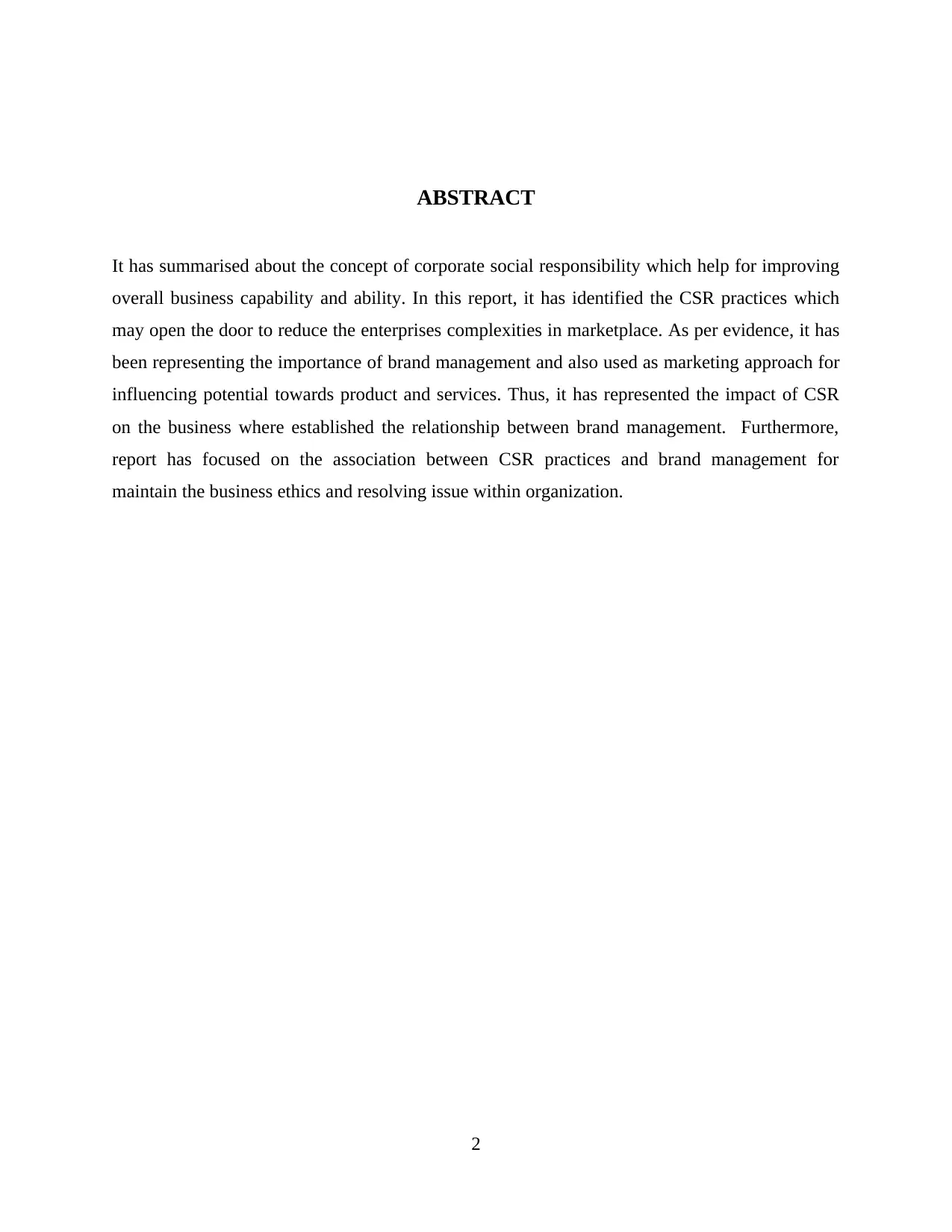
ABSTRACT
It has summarised about the concept of corporate social responsibility which help for improving
overall business capability and ability. In this report, it has identified the CSR practices which
may open the door to reduce the enterprises complexities in marketplace. As per evidence, it has
been representing the importance of brand management and also used as marketing approach for
influencing potential towards product and services. Thus, it has represented the impact of CSR
on the business where established the relationship between brand management. Furthermore,
report has focused on the association between CSR practices and brand management for
maintain the business ethics and resolving issue within organization.
2
It has summarised about the concept of corporate social responsibility which help for improving
overall business capability and ability. In this report, it has identified the CSR practices which
may open the door to reduce the enterprises complexities in marketplace. As per evidence, it has
been representing the importance of brand management and also used as marketing approach for
influencing potential towards product and services. Thus, it has represented the impact of CSR
on the business where established the relationship between brand management. Furthermore,
report has focused on the association between CSR practices and brand management for
maintain the business ethics and resolving issue within organization.
2
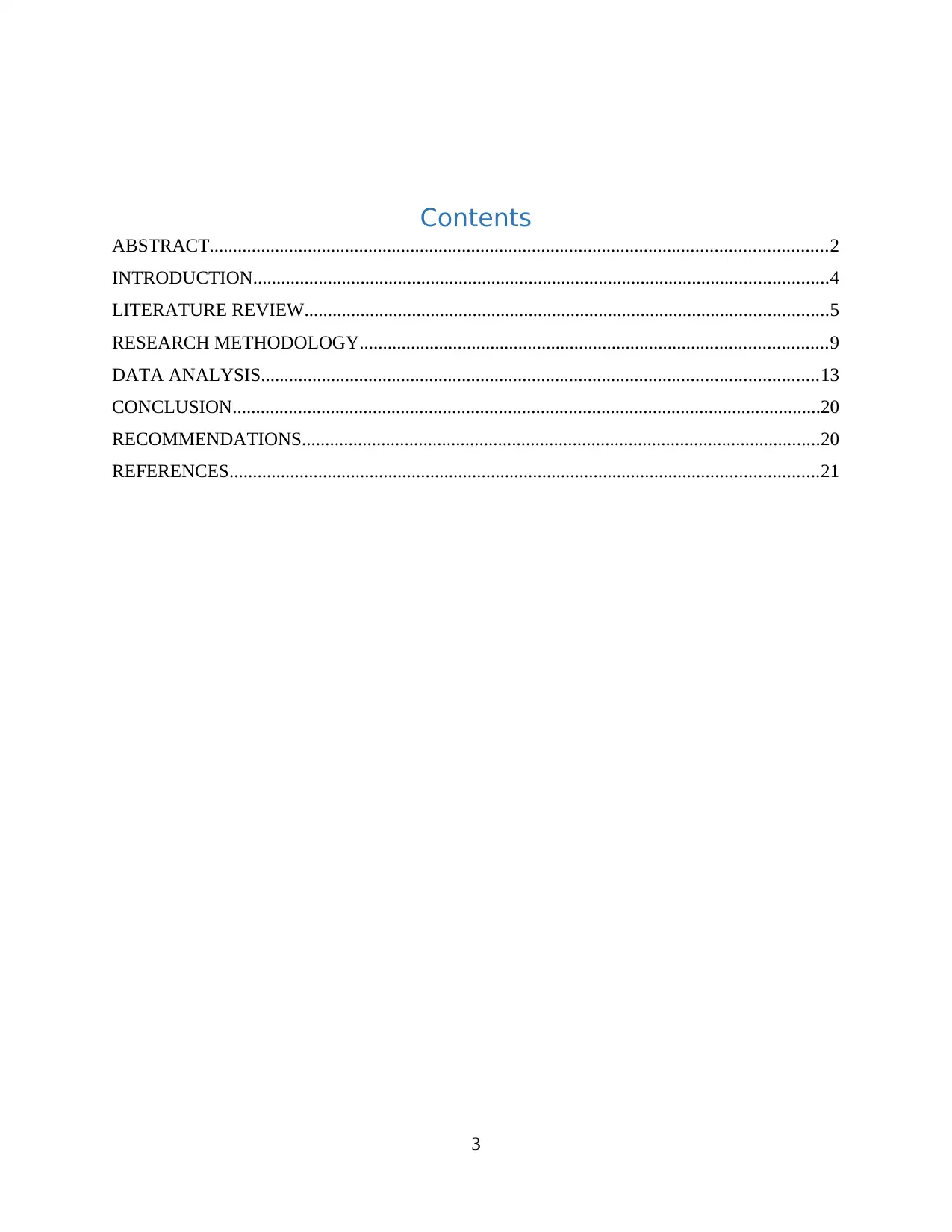
Contents
ABSTRACT....................................................................................................................................2
INTRODUCTION...........................................................................................................................4
LITERATURE REVIEW................................................................................................................5
RESEARCH METHODOLOGY....................................................................................................9
DATA ANALYSIS.......................................................................................................................13
CONCLUSION..............................................................................................................................20
RECOMMENDATIONS...............................................................................................................20
REFERENCES..............................................................................................................................21
3
ABSTRACT....................................................................................................................................2
INTRODUCTION...........................................................................................................................4
LITERATURE REVIEW................................................................................................................5
RESEARCH METHODOLOGY....................................................................................................9
DATA ANALYSIS.......................................................................................................................13
CONCLUSION..............................................................................................................................20
RECOMMENDATIONS...............................................................................................................20
REFERENCES..............................................................................................................................21
3
⊘ This is a preview!⊘
Do you want full access?
Subscribe today to unlock all pages.

Trusted by 1+ million students worldwide
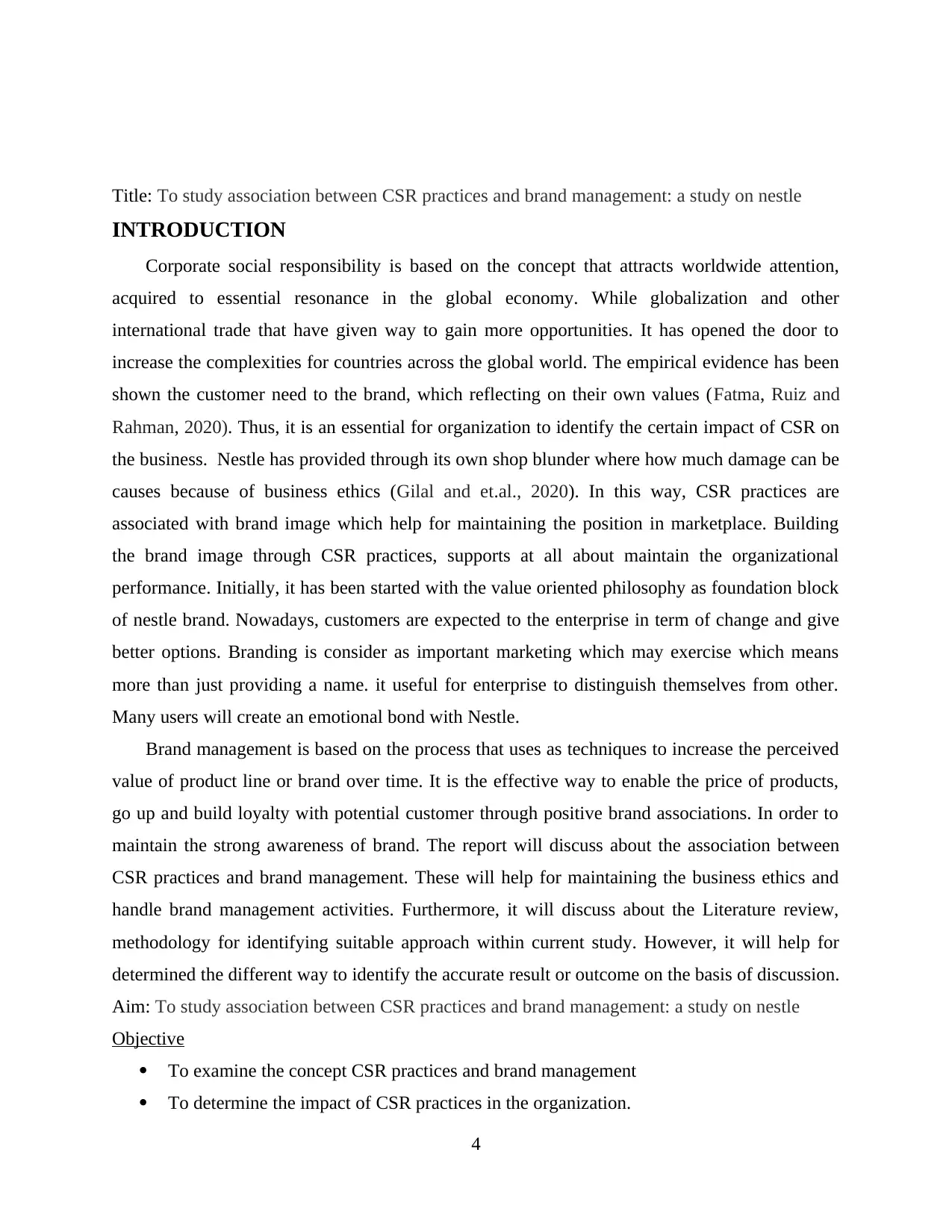
Title: To study association between CSR practices and brand management: a study on nestle
INTRODUCTION
Corporate social responsibility is based on the concept that attracts worldwide attention,
acquired to essential resonance in the global economy. While globalization and other
international trade that have given way to gain more opportunities. It has opened the door to
increase the complexities for countries across the global world. The empirical evidence has been
shown the customer need to the brand, which reflecting on their own values (Fatma, Ruiz and
Rahman, 2020). Thus, it is an essential for organization to identify the certain impact of CSR on
the business. Nestle has provided through its own shop blunder where how much damage can be
causes because of business ethics (Gilal and et.al., 2020). In this way, CSR practices are
associated with brand image which help for maintaining the position in marketplace. Building
the brand image through CSR practices, supports at all about maintain the organizational
performance. Initially, it has been started with the value oriented philosophy as foundation block
of nestle brand. Nowadays, customers are expected to the enterprise in term of change and give
better options. Branding is consider as important marketing which may exercise which means
more than just providing a name. it useful for enterprise to distinguish themselves from other.
Many users will create an emotional bond with Nestle.
Brand management is based on the process that uses as techniques to increase the perceived
value of product line or brand over time. It is the effective way to enable the price of products,
go up and build loyalty with potential customer through positive brand associations. In order to
maintain the strong awareness of brand. The report will discuss about the association between
CSR practices and brand management. These will help for maintaining the business ethics and
handle brand management activities. Furthermore, it will discuss about the Literature review,
methodology for identifying suitable approach within current study. However, it will help for
determined the different way to identify the accurate result or outcome on the basis of discussion.
Aim: To study association between CSR practices and brand management: a study on nestle
Objective
To examine the concept CSR practices and brand management
To determine the impact of CSR practices in the organization.
4
INTRODUCTION
Corporate social responsibility is based on the concept that attracts worldwide attention,
acquired to essential resonance in the global economy. While globalization and other
international trade that have given way to gain more opportunities. It has opened the door to
increase the complexities for countries across the global world. The empirical evidence has been
shown the customer need to the brand, which reflecting on their own values (Fatma, Ruiz and
Rahman, 2020). Thus, it is an essential for organization to identify the certain impact of CSR on
the business. Nestle has provided through its own shop blunder where how much damage can be
causes because of business ethics (Gilal and et.al., 2020). In this way, CSR practices are
associated with brand image which help for maintaining the position in marketplace. Building
the brand image through CSR practices, supports at all about maintain the organizational
performance. Initially, it has been started with the value oriented philosophy as foundation block
of nestle brand. Nowadays, customers are expected to the enterprise in term of change and give
better options. Branding is consider as important marketing which may exercise which means
more than just providing a name. it useful for enterprise to distinguish themselves from other.
Many users will create an emotional bond with Nestle.
Brand management is based on the process that uses as techniques to increase the perceived
value of product line or brand over time. It is the effective way to enable the price of products,
go up and build loyalty with potential customer through positive brand associations. In order to
maintain the strong awareness of brand. The report will discuss about the association between
CSR practices and brand management. These will help for maintaining the business ethics and
handle brand management activities. Furthermore, it will discuss about the Literature review,
methodology for identifying suitable approach within current study. However, it will help for
determined the different way to identify the accurate result or outcome on the basis of discussion.
Aim: To study association between CSR practices and brand management: a study on nestle
Objective
To examine the concept CSR practices and brand management
To determine the impact of CSR practices in the organization.
4
Paraphrase This Document
Need a fresh take? Get an instant paraphrase of this document with our AI Paraphraser
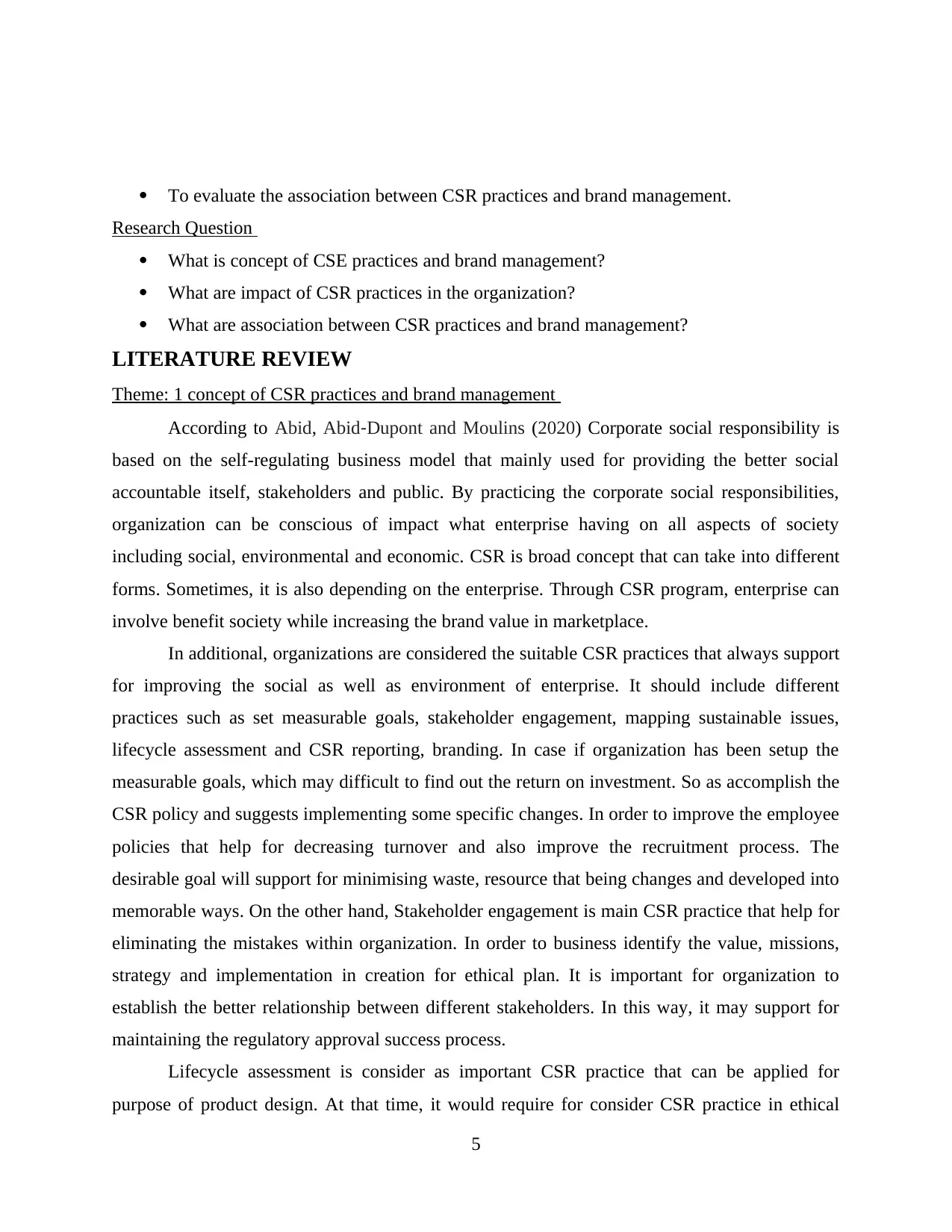
To evaluate the association between CSR practices and brand management.
Research Question
What is concept of CSE practices and brand management?
What are impact of CSR practices in the organization?
What are association between CSR practices and brand management?
LITERATURE REVIEW
Theme: 1 concept of CSR practices and brand management
According to Abid, Abid‐Dupont and Moulins (2020) Corporate social responsibility is
based on the self-regulating business model that mainly used for providing the better social
accountable itself, stakeholders and public. By practicing the corporate social responsibilities,
organization can be conscious of impact what enterprise having on all aspects of society
including social, environmental and economic. CSR is broad concept that can take into different
forms. Sometimes, it is also depending on the enterprise. Through CSR program, enterprise can
involve benefit society while increasing the brand value in marketplace.
In additional, organizations are considered the suitable CSR practices that always support
for improving the social as well as environment of enterprise. It should include different
practices such as set measurable goals, stakeholder engagement, mapping sustainable issues,
lifecycle assessment and CSR reporting, branding. In case if organization has been setup the
measurable goals, which may difficult to find out the return on investment. So as accomplish the
CSR policy and suggests implementing some specific changes. In order to improve the employee
policies that help for decreasing turnover and also improve the recruitment process. The
desirable goal will support for minimising waste, resource that being changes and developed into
memorable ways. On the other hand, Stakeholder engagement is main CSR practice that help for
eliminating the mistakes within organization. In order to business identify the value, missions,
strategy and implementation in creation for ethical plan. It is important for organization to
establish the better relationship between different stakeholders. In this way, it may support for
maintaining the regulatory approval success process.
Lifecycle assessment is consider as important CSR practice that can be applied for
purpose of product design. At that time, it would require for consider CSR practice in ethical
5
Research Question
What is concept of CSE practices and brand management?
What are impact of CSR practices in the organization?
What are association between CSR practices and brand management?
LITERATURE REVIEW
Theme: 1 concept of CSR practices and brand management
According to Abid, Abid‐Dupont and Moulins (2020) Corporate social responsibility is
based on the self-regulating business model that mainly used for providing the better social
accountable itself, stakeholders and public. By practicing the corporate social responsibilities,
organization can be conscious of impact what enterprise having on all aspects of society
including social, environmental and economic. CSR is broad concept that can take into different
forms. Sometimes, it is also depending on the enterprise. Through CSR program, enterprise can
involve benefit society while increasing the brand value in marketplace.
In additional, organizations are considered the suitable CSR practices that always support
for improving the social as well as environment of enterprise. It should include different
practices such as set measurable goals, stakeholder engagement, mapping sustainable issues,
lifecycle assessment and CSR reporting, branding. In case if organization has been setup the
measurable goals, which may difficult to find out the return on investment. So as accomplish the
CSR policy and suggests implementing some specific changes. In order to improve the employee
policies that help for decreasing turnover and also improve the recruitment process. The
desirable goal will support for minimising waste, resource that being changes and developed into
memorable ways. On the other hand, Stakeholder engagement is main CSR practice that help for
eliminating the mistakes within organization. In order to business identify the value, missions,
strategy and implementation in creation for ethical plan. It is important for organization to
establish the better relationship between different stakeholders. In this way, it may support for
maintaining the regulatory approval success process.
Lifecycle assessment is consider as important CSR practice that can be applied for
purpose of product design. At that time, it would require for consider CSR practice in ethical
5
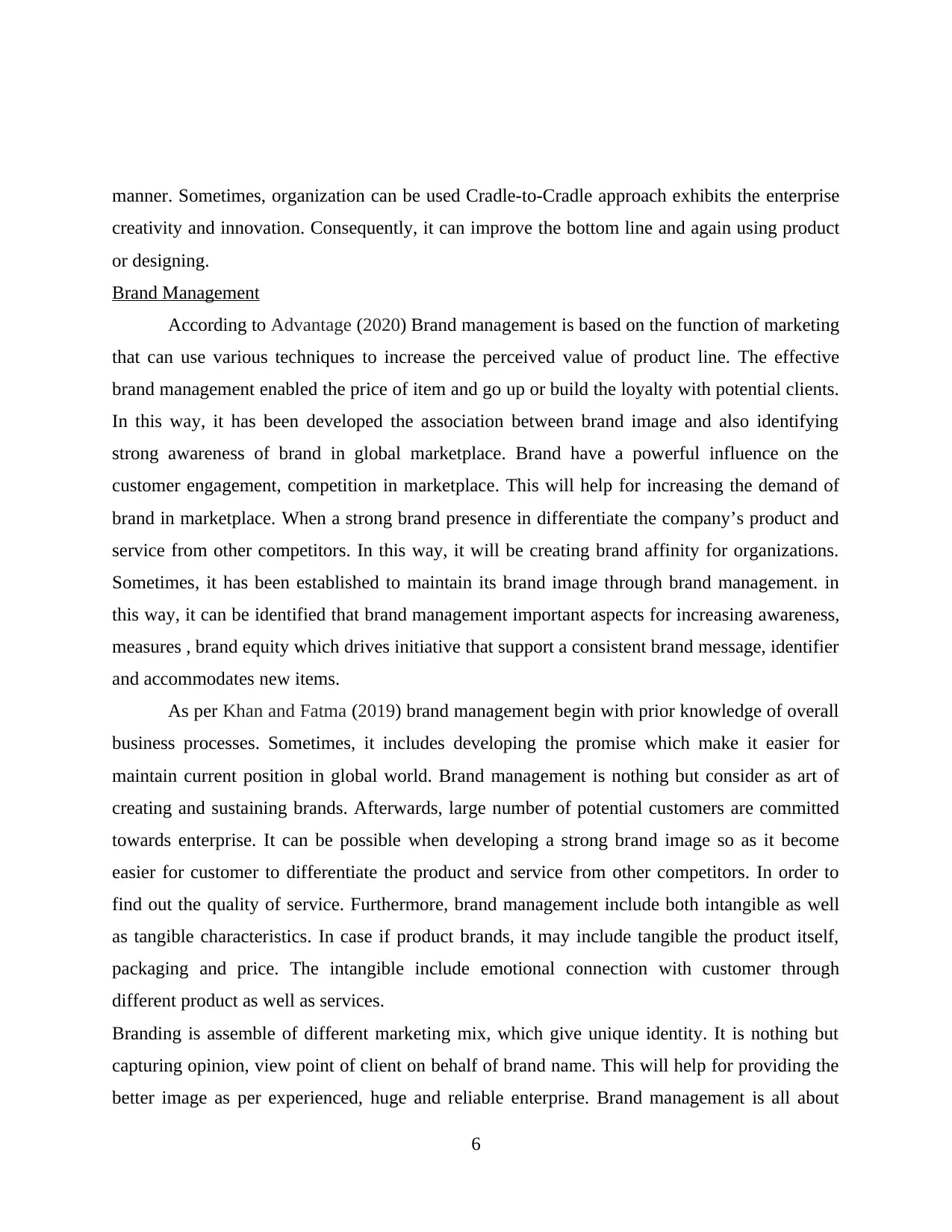
manner. Sometimes, organization can be used Cradle-to-Cradle approach exhibits the enterprise
creativity and innovation. Consequently, it can improve the bottom line and again using product
or designing.
Brand Management
According to Advantage (2020) Brand management is based on the function of marketing
that can use various techniques to increase the perceived value of product line. The effective
brand management enabled the price of item and go up or build the loyalty with potential clients.
In this way, it has been developed the association between brand image and also identifying
strong awareness of brand in global marketplace. Brand have a powerful influence on the
customer engagement, competition in marketplace. This will help for increasing the demand of
brand in marketplace. When a strong brand presence in differentiate the company’s product and
service from other competitors. In this way, it will be creating brand affinity for organizations.
Sometimes, it has been established to maintain its brand image through brand management. in
this way, it can be identified that brand management important aspects for increasing awareness,
measures , brand equity which drives initiative that support a consistent brand message, identifier
and accommodates new items.
As per Khan and Fatma (2019) brand management begin with prior knowledge of overall
business processes. Sometimes, it includes developing the promise which make it easier for
maintain current position in global world. Brand management is nothing but consider as art of
creating and sustaining brands. Afterwards, large number of potential customers are committed
towards enterprise. It can be possible when developing a strong brand image so as it become
easier for customer to differentiate the product and service from other competitors. In order to
find out the quality of service. Furthermore, brand management include both intangible as well
as tangible characteristics. In case if product brands, it may include tangible the product itself,
packaging and price. The intangible include emotional connection with customer through
different product as well as services.
Branding is assemble of different marketing mix, which give unique identity. It is nothing but
capturing opinion, view point of client on behalf of brand name. This will help for providing the
better image as per experienced, huge and reliable enterprise. Brand management is all about
6
creativity and innovation. Consequently, it can improve the bottom line and again using product
or designing.
Brand Management
According to Advantage (2020) Brand management is based on the function of marketing
that can use various techniques to increase the perceived value of product line. The effective
brand management enabled the price of item and go up or build the loyalty with potential clients.
In this way, it has been developed the association between brand image and also identifying
strong awareness of brand in global marketplace. Brand have a powerful influence on the
customer engagement, competition in marketplace. This will help for increasing the demand of
brand in marketplace. When a strong brand presence in differentiate the company’s product and
service from other competitors. In this way, it will be creating brand affinity for organizations.
Sometimes, it has been established to maintain its brand image through brand management. in
this way, it can be identified that brand management important aspects for increasing awareness,
measures , brand equity which drives initiative that support a consistent brand message, identifier
and accommodates new items.
As per Khan and Fatma (2019) brand management begin with prior knowledge of overall
business processes. Sometimes, it includes developing the promise which make it easier for
maintain current position in global world. Brand management is nothing but consider as art of
creating and sustaining brands. Afterwards, large number of potential customers are committed
towards enterprise. It can be possible when developing a strong brand image so as it become
easier for customer to differentiate the product and service from other competitors. In order to
find out the quality of service. Furthermore, brand management include both intangible as well
as tangible characteristics. In case if product brands, it may include tangible the product itself,
packaging and price. The intangible include emotional connection with customer through
different product as well as services.
Branding is assemble of different marketing mix, which give unique identity. It is nothing but
capturing opinion, view point of client on behalf of brand name. This will help for providing the
better image as per experienced, huge and reliable enterprise. Brand management is all about
6
⊘ This is a preview!⊘
Do you want full access?
Subscribe today to unlock all pages.

Trusted by 1+ million students worldwide
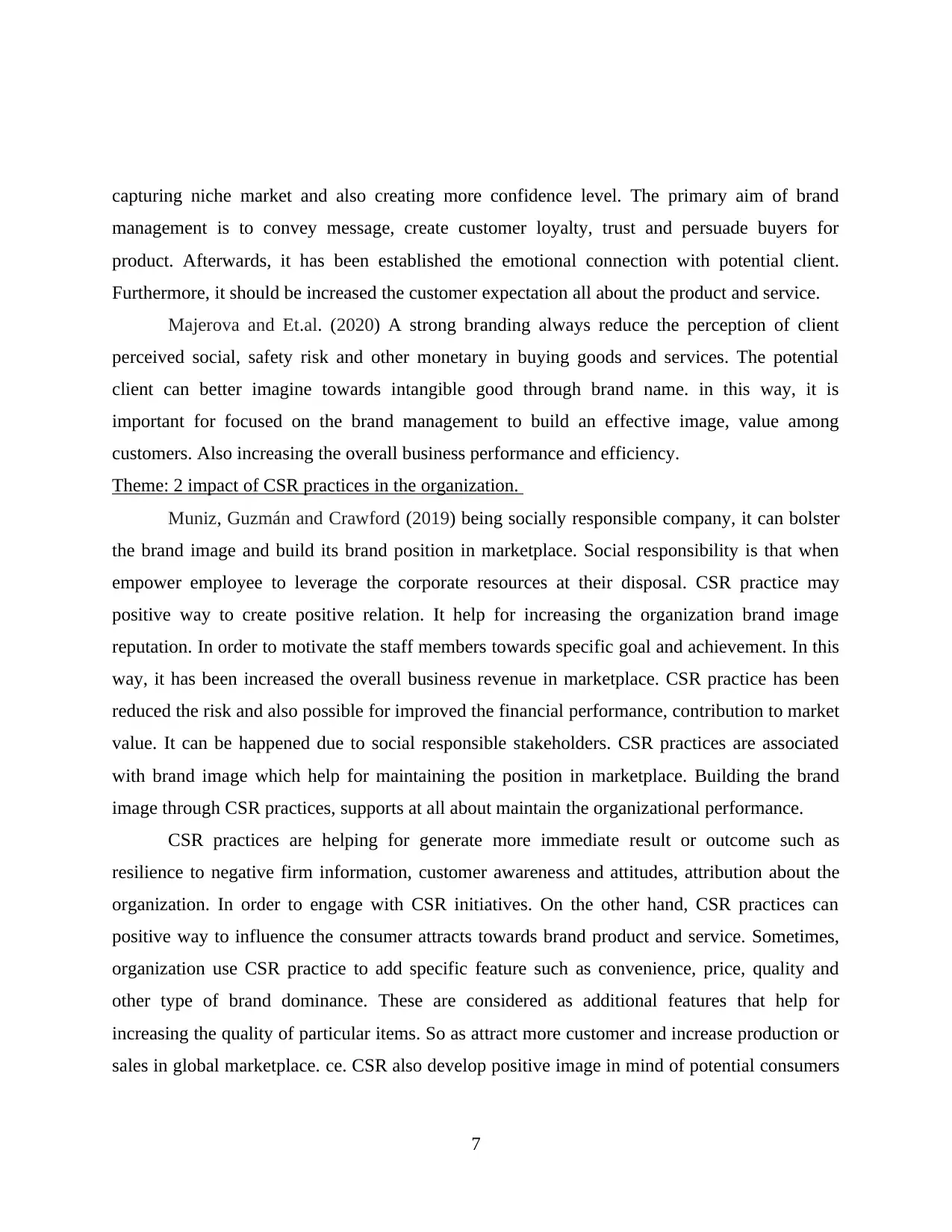
capturing niche market and also creating more confidence level. The primary aim of brand
management is to convey message, create customer loyalty, trust and persuade buyers for
product. Afterwards, it has been established the emotional connection with potential client.
Furthermore, it should be increased the customer expectation all about the product and service.
Majerova and Et.al. (2020) A strong branding always reduce the perception of client
perceived social, safety risk and other monetary in buying goods and services. The potential
client can better imagine towards intangible good through brand name. in this way, it is
important for focused on the brand management to build an effective image, value among
customers. Also increasing the overall business performance and efficiency.
Theme: 2 impact of CSR practices in the organization.
Muniz, Guzmán and Crawford (2019) being socially responsible company, it can bolster
the brand image and build its brand position in marketplace. Social responsibility is that when
empower employee to leverage the corporate resources at their disposal. CSR practice may
positive way to create positive relation. It help for increasing the organization brand image
reputation. In order to motivate the staff members towards specific goal and achievement. In this
way, it has been increased the overall business revenue in marketplace. CSR practice has been
reduced the risk and also possible for improved the financial performance, contribution to market
value. It can be happened due to social responsible stakeholders. CSR practices are associated
with brand image which help for maintaining the position in marketplace. Building the brand
image through CSR practices, supports at all about maintain the organizational performance.
CSR practices are helping for generate more immediate result or outcome such as
resilience to negative firm information, customer awareness and attitudes, attribution about the
organization. In order to engage with CSR initiatives. On the other hand, CSR practices can
positive way to influence the consumer attracts towards brand product and service. Sometimes,
organization use CSR practice to add specific feature such as convenience, price, quality and
other type of brand dominance. These are considered as additional features that help for
increasing the quality of particular items. So as attract more customer and increase production or
sales in global marketplace. ce. CSR also develop positive image in mind of potential consumers
7
management is to convey message, create customer loyalty, trust and persuade buyers for
product. Afterwards, it has been established the emotional connection with potential client.
Furthermore, it should be increased the customer expectation all about the product and service.
Majerova and Et.al. (2020) A strong branding always reduce the perception of client
perceived social, safety risk and other monetary in buying goods and services. The potential
client can better imagine towards intangible good through brand name. in this way, it is
important for focused on the brand management to build an effective image, value among
customers. Also increasing the overall business performance and efficiency.
Theme: 2 impact of CSR practices in the organization.
Muniz, Guzmán and Crawford (2019) being socially responsible company, it can bolster
the brand image and build its brand position in marketplace. Social responsibility is that when
empower employee to leverage the corporate resources at their disposal. CSR practice may
positive way to create positive relation. It help for increasing the organization brand image
reputation. In order to motivate the staff members towards specific goal and achievement. In this
way, it has been increased the overall business revenue in marketplace. CSR practice has been
reduced the risk and also possible for improved the financial performance, contribution to market
value. It can be happened due to social responsible stakeholders. CSR practices are associated
with brand image which help for maintaining the position in marketplace. Building the brand
image through CSR practices, supports at all about maintain the organizational performance.
CSR practices are helping for generate more immediate result or outcome such as
resilience to negative firm information, customer awareness and attitudes, attribution about the
organization. In order to engage with CSR initiatives. On the other hand, CSR practices can
positive way to influence the consumer attracts towards brand product and service. Sometimes,
organization use CSR practice to add specific feature such as convenience, price, quality and
other type of brand dominance. These are considered as additional features that help for
increasing the quality of particular items. So as attract more customer and increase production or
sales in global marketplace. ce. CSR also develop positive image in mind of potential consumers
7
Paraphrase This Document
Need a fresh take? Get an instant paraphrase of this document with our AI Paraphraser

as well as influence of CSR on the brand activities are positive impact on the attitude to brand
and good purchase intentions.
8
and good purchase intentions.
8
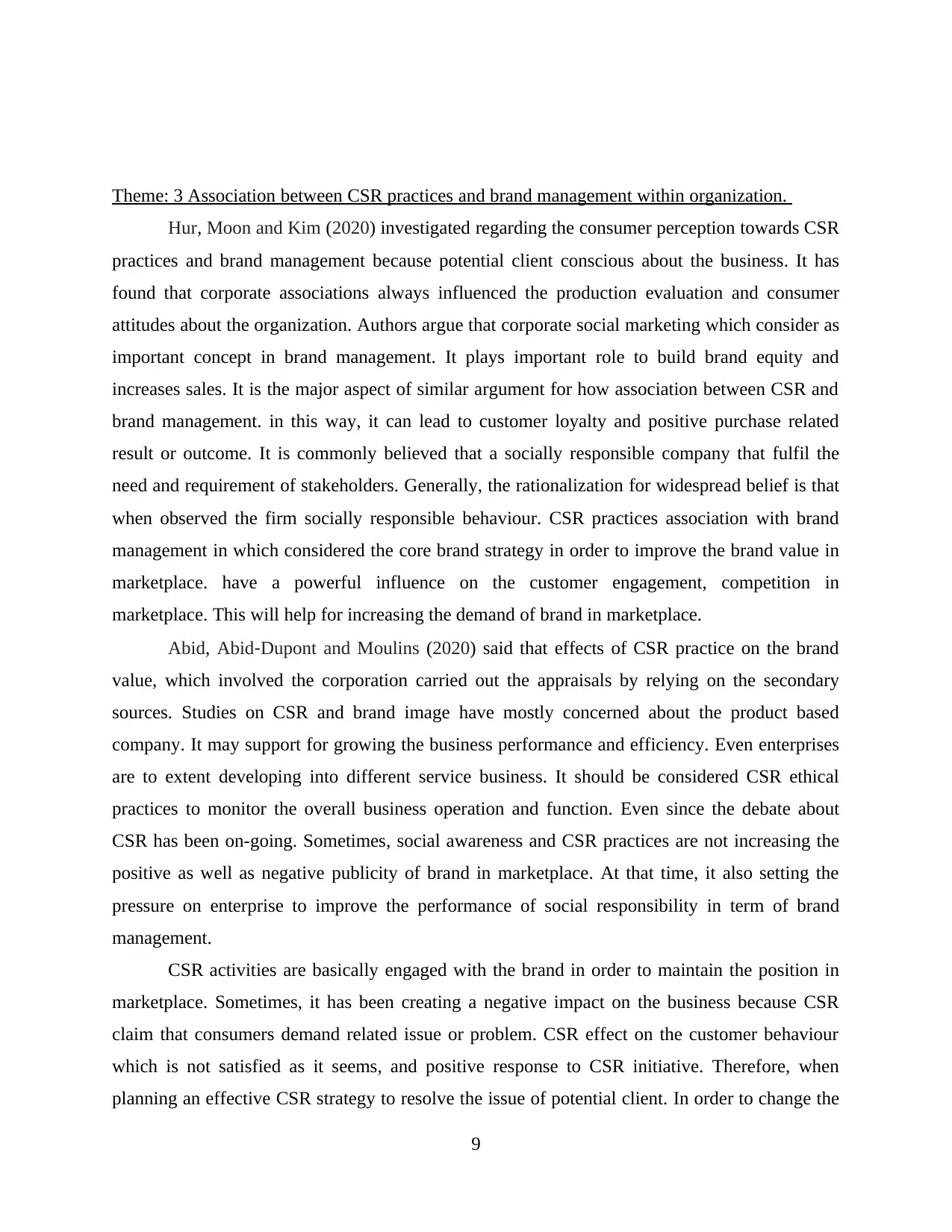
Theme: 3 Association between CSR practices and brand management within organization.
Hur, Moon and Kim (2020) investigated regarding the consumer perception towards CSR
practices and brand management because potential client conscious about the business. It has
found that corporate associations always influenced the production evaluation and consumer
attitudes about the organization. Authors argue that corporate social marketing which consider as
important concept in brand management. It plays important role to build brand equity and
increases sales. It is the major aspect of similar argument for how association between CSR and
brand management. in this way, it can lead to customer loyalty and positive purchase related
result or outcome. It is commonly believed that a socially responsible company that fulfil the
need and requirement of stakeholders. Generally, the rationalization for widespread belief is that
when observed the firm socially responsible behaviour. CSR practices association with brand
management in which considered the core brand strategy in order to improve the brand value in
marketplace. have a powerful influence on the customer engagement, competition in
marketplace. This will help for increasing the demand of brand in marketplace.
Abid, Abid‐Dupont and Moulins (2020) said that effects of CSR practice on the brand
value, which involved the corporation carried out the appraisals by relying on the secondary
sources. Studies on CSR and brand image have mostly concerned about the product based
company. It may support for growing the business performance and efficiency. Even enterprises
are to extent developing into different service business. It should be considered CSR ethical
practices to monitor the overall business operation and function. Even since the debate about
CSR has been on-going. Sometimes, social awareness and CSR practices are not increasing the
positive as well as negative publicity of brand in marketplace. At that time, it also setting the
pressure on enterprise to improve the performance of social responsibility in term of brand
management.
CSR activities are basically engaged with the brand in order to maintain the position in
marketplace. Sometimes, it has been creating a negative impact on the business because CSR
claim that consumers demand related issue or problem. CSR effect on the customer behaviour
which is not satisfied as it seems, and positive response to CSR initiative. Therefore, when
planning an effective CSR strategy to resolve the issue of potential client. In order to change the
9
Hur, Moon and Kim (2020) investigated regarding the consumer perception towards CSR
practices and brand management because potential client conscious about the business. It has
found that corporate associations always influenced the production evaluation and consumer
attitudes about the organization. Authors argue that corporate social marketing which consider as
important concept in brand management. It plays important role to build brand equity and
increases sales. It is the major aspect of similar argument for how association between CSR and
brand management. in this way, it can lead to customer loyalty and positive purchase related
result or outcome. It is commonly believed that a socially responsible company that fulfil the
need and requirement of stakeholders. Generally, the rationalization for widespread belief is that
when observed the firm socially responsible behaviour. CSR practices association with brand
management in which considered the core brand strategy in order to improve the brand value in
marketplace. have a powerful influence on the customer engagement, competition in
marketplace. This will help for increasing the demand of brand in marketplace.
Abid, Abid‐Dupont and Moulins (2020) said that effects of CSR practice on the brand
value, which involved the corporation carried out the appraisals by relying on the secondary
sources. Studies on CSR and brand image have mostly concerned about the product based
company. It may support for growing the business performance and efficiency. Even enterprises
are to extent developing into different service business. It should be considered CSR ethical
practices to monitor the overall business operation and function. Even since the debate about
CSR has been on-going. Sometimes, social awareness and CSR practices are not increasing the
positive as well as negative publicity of brand in marketplace. At that time, it also setting the
pressure on enterprise to improve the performance of social responsibility in term of brand
management.
CSR activities are basically engaged with the brand in order to maintain the position in
marketplace. Sometimes, it has been creating a negative impact on the business because CSR
claim that consumers demand related issue or problem. CSR effect on the customer behaviour
which is not satisfied as it seems, and positive response to CSR initiative. Therefore, when
planning an effective CSR strategy to resolve the issue of potential client. In order to change the
9
⊘ This is a preview!⊘
Do you want full access?
Subscribe today to unlock all pages.

Trusted by 1+ million students worldwide
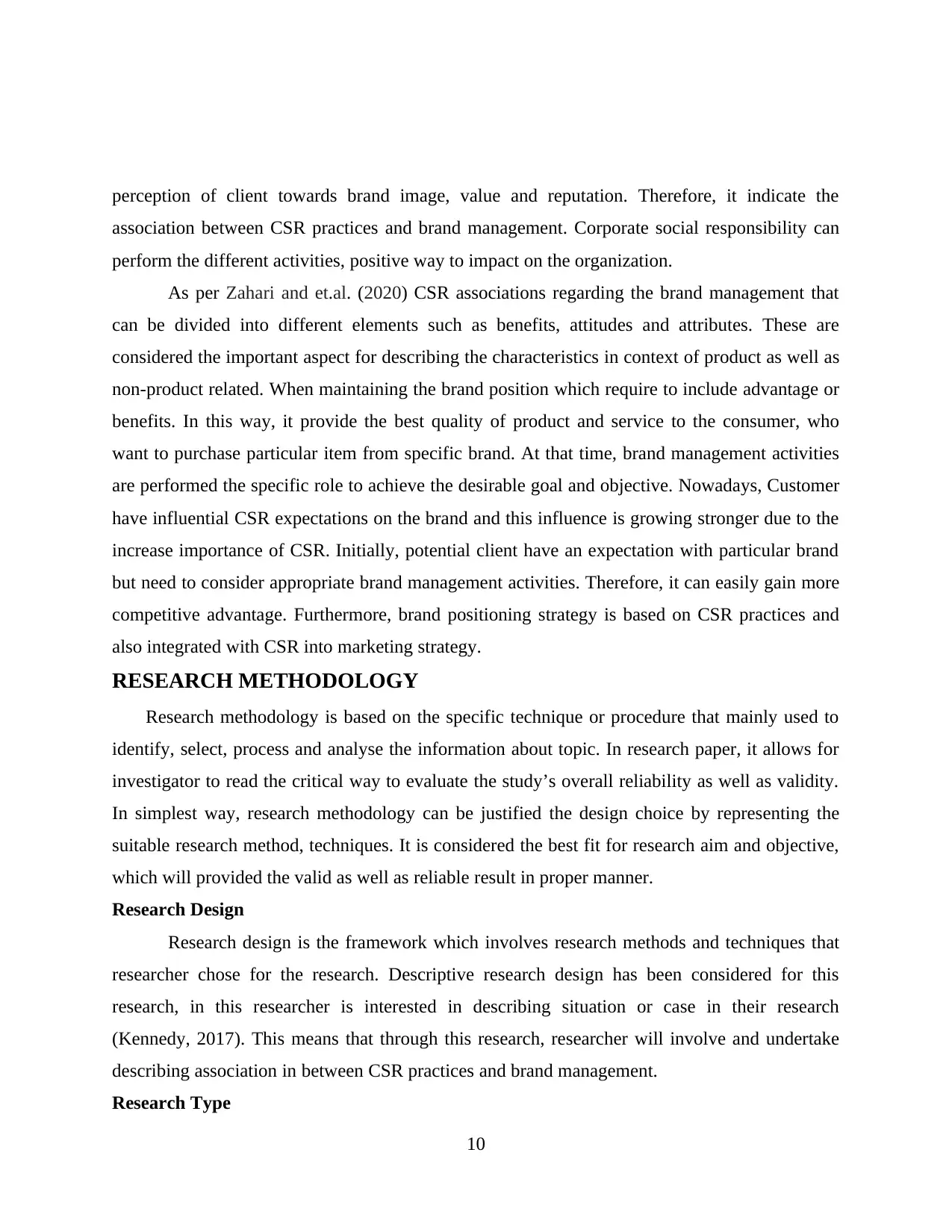
perception of client towards brand image, value and reputation. Therefore, it indicate the
association between CSR practices and brand management. Corporate social responsibility can
perform the different activities, positive way to impact on the organization.
As per Zahari and et.al. (2020) CSR associations regarding the brand management that
can be divided into different elements such as benefits, attitudes and attributes. These are
considered the important aspect for describing the characteristics in context of product as well as
non-product related. When maintaining the brand position which require to include advantage or
benefits. In this way, it provide the best quality of product and service to the consumer, who
want to purchase particular item from specific brand. At that time, brand management activities
are performed the specific role to achieve the desirable goal and objective. Nowadays, Customer
have influential CSR expectations on the brand and this influence is growing stronger due to the
increase importance of CSR. Initially, potential client have an expectation with particular brand
but need to consider appropriate brand management activities. Therefore, it can easily gain more
competitive advantage. Furthermore, brand positioning strategy is based on CSR practices and
also integrated with CSR into marketing strategy.
RESEARCH METHODOLOGY
Research methodology is based on the specific technique or procedure that mainly used to
identify, select, process and analyse the information about topic. In research paper, it allows for
investigator to read the critical way to evaluate the study’s overall reliability as well as validity.
In simplest way, research methodology can be justified the design choice by representing the
suitable research method, techniques. It is considered the best fit for research aim and objective,
which will provided the valid as well as reliable result in proper manner.
Research Design
Research design is the framework which involves research methods and techniques that
researcher chose for the research. Descriptive research design has been considered for this
research, in this researcher is interested in describing situation or case in their research
(Kennedy, 2017). This means that through this research, researcher will involve and undertake
describing association in between CSR practices and brand management.
Research Type
10
association between CSR practices and brand management. Corporate social responsibility can
perform the different activities, positive way to impact on the organization.
As per Zahari and et.al. (2020) CSR associations regarding the brand management that
can be divided into different elements such as benefits, attitudes and attributes. These are
considered the important aspect for describing the characteristics in context of product as well as
non-product related. When maintaining the brand position which require to include advantage or
benefits. In this way, it provide the best quality of product and service to the consumer, who
want to purchase particular item from specific brand. At that time, brand management activities
are performed the specific role to achieve the desirable goal and objective. Nowadays, Customer
have influential CSR expectations on the brand and this influence is growing stronger due to the
increase importance of CSR. Initially, potential client have an expectation with particular brand
but need to consider appropriate brand management activities. Therefore, it can easily gain more
competitive advantage. Furthermore, brand positioning strategy is based on CSR practices and
also integrated with CSR into marketing strategy.
RESEARCH METHODOLOGY
Research methodology is based on the specific technique or procedure that mainly used to
identify, select, process and analyse the information about topic. In research paper, it allows for
investigator to read the critical way to evaluate the study’s overall reliability as well as validity.
In simplest way, research methodology can be justified the design choice by representing the
suitable research method, techniques. It is considered the best fit for research aim and objective,
which will provided the valid as well as reliable result in proper manner.
Research Design
Research design is the framework which involves research methods and techniques that
researcher chose for the research. Descriptive research design has been considered for this
research, in this researcher is interested in describing situation or case in their research
(Kennedy, 2017). This means that through this research, researcher will involve and undertake
describing association in between CSR practices and brand management.
Research Type
10
Paraphrase This Document
Need a fresh take? Get an instant paraphrase of this document with our AI Paraphraser
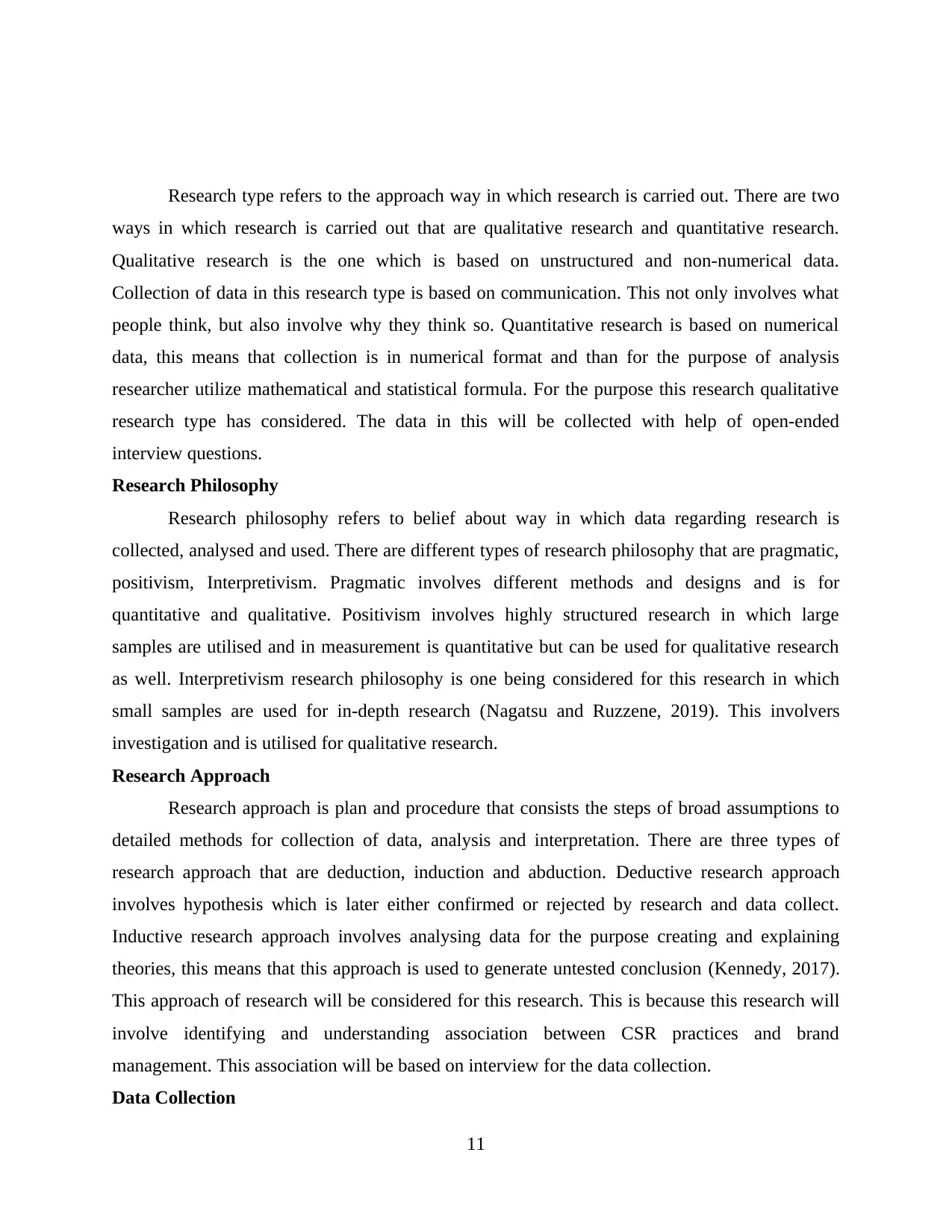
Research type refers to the approach way in which research is carried out. There are two
ways in which research is carried out that are qualitative research and quantitative research.
Qualitative research is the one which is based on unstructured and non-numerical data.
Collection of data in this research type is based on communication. This not only involves what
people think, but also involve why they think so. Quantitative research is based on numerical
data, this means that collection is in numerical format and than for the purpose of analysis
researcher utilize mathematical and statistical formula. For the purpose this research qualitative
research type has considered. The data in this will be collected with help of open-ended
interview questions.
Research Philosophy
Research philosophy refers to belief about way in which data regarding research is
collected, analysed and used. There are different types of research philosophy that are pragmatic,
positivism, Interpretivism. Pragmatic involves different methods and designs and is for
quantitative and qualitative. Positivism involves highly structured research in which large
samples are utilised and in measurement is quantitative but can be used for qualitative research
as well. Interpretivism research philosophy is one being considered for this research in which
small samples are used for in-depth research (Nagatsu and Ruzzene, 2019). This involvers
investigation and is utilised for qualitative research.
Research Approach
Research approach is plan and procedure that consists the steps of broad assumptions to
detailed methods for collection of data, analysis and interpretation. There are three types of
research approach that are deduction, induction and abduction. Deductive research approach
involves hypothesis which is later either confirmed or rejected by research and data collect.
Inductive research approach involves analysing data for the purpose creating and explaining
theories, this means that this approach is used to generate untested conclusion (Kennedy, 2017).
This approach of research will be considered for this research. This is because this research will
involve identifying and understanding association between CSR practices and brand
management. This association will be based on interview for the data collection.
Data Collection
11
ways in which research is carried out that are qualitative research and quantitative research.
Qualitative research is the one which is based on unstructured and non-numerical data.
Collection of data in this research type is based on communication. This not only involves what
people think, but also involve why they think so. Quantitative research is based on numerical
data, this means that collection is in numerical format and than for the purpose of analysis
researcher utilize mathematical and statistical formula. For the purpose this research qualitative
research type has considered. The data in this will be collected with help of open-ended
interview questions.
Research Philosophy
Research philosophy refers to belief about way in which data regarding research is
collected, analysed and used. There are different types of research philosophy that are pragmatic,
positivism, Interpretivism. Pragmatic involves different methods and designs and is for
quantitative and qualitative. Positivism involves highly structured research in which large
samples are utilised and in measurement is quantitative but can be used for qualitative research
as well. Interpretivism research philosophy is one being considered for this research in which
small samples are used for in-depth research (Nagatsu and Ruzzene, 2019). This involvers
investigation and is utilised for qualitative research.
Research Approach
Research approach is plan and procedure that consists the steps of broad assumptions to
detailed methods for collection of data, analysis and interpretation. There are three types of
research approach that are deduction, induction and abduction. Deductive research approach
involves hypothesis which is later either confirmed or rejected by research and data collect.
Inductive research approach involves analysing data for the purpose creating and explaining
theories, this means that this approach is used to generate untested conclusion (Kennedy, 2017).
This approach of research will be considered for this research. This is because this research will
involve identifying and understanding association between CSR practices and brand
management. This association will be based on interview for the data collection.
Data Collection
11
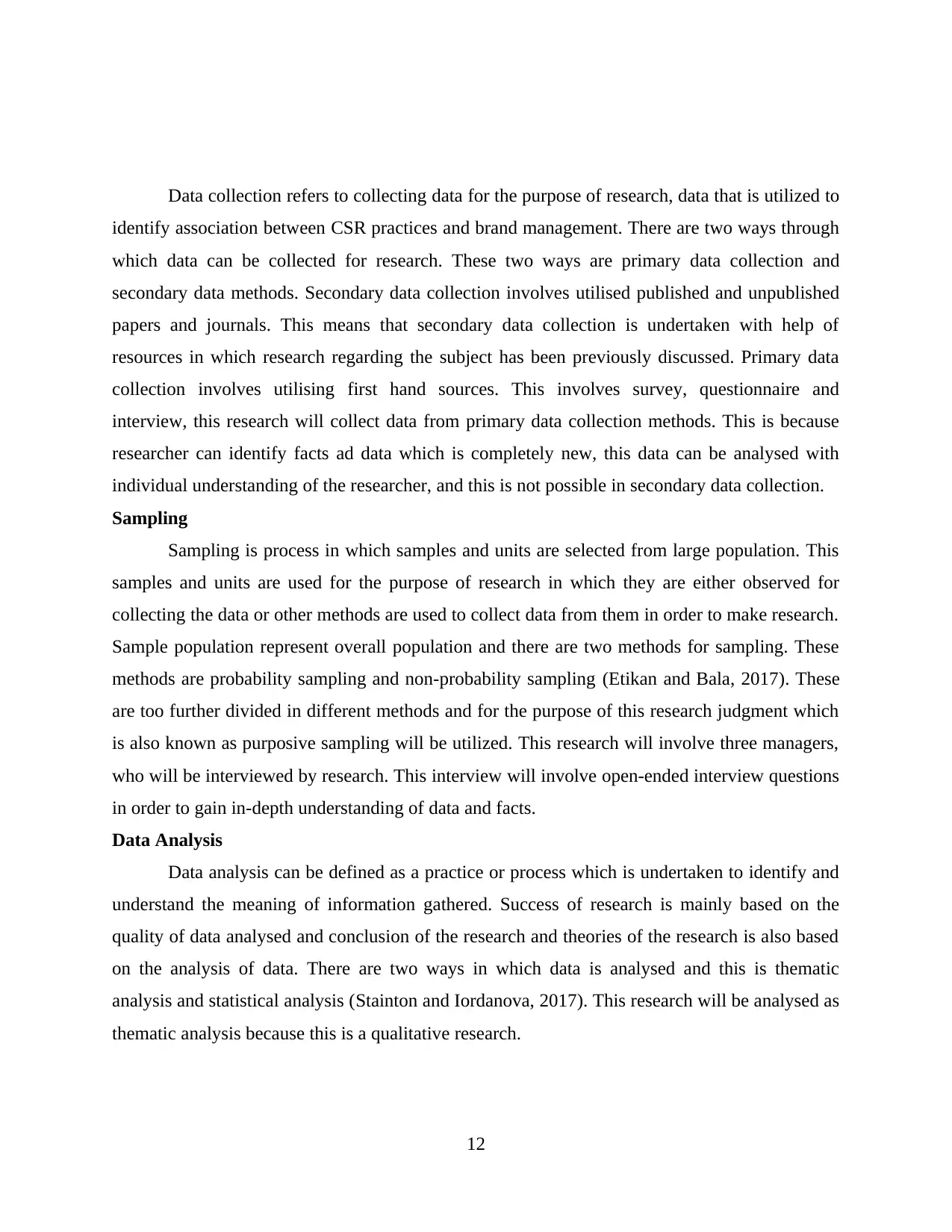
Data collection refers to collecting data for the purpose of research, data that is utilized to
identify association between CSR practices and brand management. There are two ways through
which data can be collected for research. These two ways are primary data collection and
secondary data methods. Secondary data collection involves utilised published and unpublished
papers and journals. This means that secondary data collection is undertaken with help of
resources in which research regarding the subject has been previously discussed. Primary data
collection involves utilising first hand sources. This involves survey, questionnaire and
interview, this research will collect data from primary data collection methods. This is because
researcher can identify facts ad data which is completely new, this data can be analysed with
individual understanding of the researcher, and this is not possible in secondary data collection.
Sampling
Sampling is process in which samples and units are selected from large population. This
samples and units are used for the purpose of research in which they are either observed for
collecting the data or other methods are used to collect data from them in order to make research.
Sample population represent overall population and there are two methods for sampling. These
methods are probability sampling and non-probability sampling (Etikan and Bala, 2017). These
are too further divided in different methods and for the purpose of this research judgment which
is also known as purposive sampling will be utilized. This research will involve three managers,
who will be interviewed by research. This interview will involve open-ended interview questions
in order to gain in-depth understanding of data and facts.
Data Analysis
Data analysis can be defined as a practice or process which is undertaken to identify and
understand the meaning of information gathered. Success of research is mainly based on the
quality of data analysed and conclusion of the research and theories of the research is also based
on the analysis of data. There are two ways in which data is analysed and this is thematic
analysis and statistical analysis (Stainton and Iordanova, 2017). This research will be analysed as
thematic analysis because this is a qualitative research.
12
identify association between CSR practices and brand management. There are two ways through
which data can be collected for research. These two ways are primary data collection and
secondary data methods. Secondary data collection involves utilised published and unpublished
papers and journals. This means that secondary data collection is undertaken with help of
resources in which research regarding the subject has been previously discussed. Primary data
collection involves utilising first hand sources. This involves survey, questionnaire and
interview, this research will collect data from primary data collection methods. This is because
researcher can identify facts ad data which is completely new, this data can be analysed with
individual understanding of the researcher, and this is not possible in secondary data collection.
Sampling
Sampling is process in which samples and units are selected from large population. This
samples and units are used for the purpose of research in which they are either observed for
collecting the data or other methods are used to collect data from them in order to make research.
Sample population represent overall population and there are two methods for sampling. These
methods are probability sampling and non-probability sampling (Etikan and Bala, 2017). These
are too further divided in different methods and for the purpose of this research judgment which
is also known as purposive sampling will be utilized. This research will involve three managers,
who will be interviewed by research. This interview will involve open-ended interview questions
in order to gain in-depth understanding of data and facts.
Data Analysis
Data analysis can be defined as a practice or process which is undertaken to identify and
understand the meaning of information gathered. Success of research is mainly based on the
quality of data analysed and conclusion of the research and theories of the research is also based
on the analysis of data. There are two ways in which data is analysed and this is thematic
analysis and statistical analysis (Stainton and Iordanova, 2017). This research will be analysed as
thematic analysis because this is a qualitative research.
12
⊘ This is a preview!⊘
Do you want full access?
Subscribe today to unlock all pages.

Trusted by 1+ million students worldwide
1 out of 23
Related Documents
Your All-in-One AI-Powered Toolkit for Academic Success.
+13062052269
info@desklib.com
Available 24*7 on WhatsApp / Email
![[object Object]](/_next/static/media/star-bottom.7253800d.svg)
Unlock your academic potential
Copyright © 2020–2025 A2Z Services. All Rights Reserved. Developed and managed by ZUCOL.





